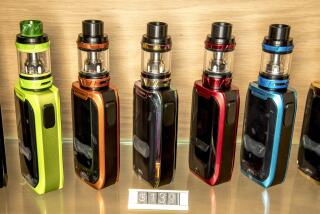Tobacco giant presses its case for a better-for-you cigarette
Philip Morris International, the company that supplies Marlboros, Parliaments and Virginia Slims to smokers across the globe, is looking to get into a less dangerous line of business. At a meeting this week outside Washington, the world’s premier purveyor of cigarettes is trying to convince a panel convened by the Food and Drug Administration that its newest offering will be a boon to the nation’s public health.
Philip Morris and its U.S. partner, Altria, want the FDA’s permission to sell a tobacco product it calls the IQOS system in the United States.
They’re prepared to tell potential customers that IQOS is not danger-free. But they want the FDA to greenlight a tantalizing marketing claim: that, for those who switch from cigarettes to IQOS, the result will be lower exposure to harmful chemicals and a reduced risk of tobacco-related disease.
Philip Morris hopes the system will transform the market for tobacco products, and it certainly looks the part.
Available in matte black or modern white, its sleek cylinder encloses a filtered roll of dried tobacco product called a “HeatStick.” With a click, the holder draws a blade heated to 350 degrees through the dried leaf. After 14 puffs or six minutes, a user returns the holder to a case that looks like it could be the latest wireless device. The system is quickly recharged and ready to toast up another heat stick.
For the user, the IQOS system delivers nicotine like an e-cigarette, but with the taste and buzz of tobacco. A cigarette burns at 600 degrees, but at 350 degrees, the HeatStick tobacco never ignites. The user exhales a largely odorless vapor in which some of the most toxic byproducts of combustion — carbon monoxide, nitrogen oxides, formaldehyde, mercury and ammonia — are reduced by 69% to 99.9% compared to the average cigarette on the market.
Some 42 million Americans continue to smoke cigarettes. That’s a potentially lucrative market for IQOS, which is already sold in close to 30 other countries. In the United Kingdom and Japan, which have accepted Philip Morris’ claim that IQOS is a “risk-reduction” product, the device sells for roughly $70, and a pack of 20 HeatSticks fetches about $10.
But to gain access to U.S. smokers, Philip Morris and Altria must navigate a gauntlet of regulatory scrutiny.
Sometime this spring, FDA Commissioner Scott Gottlieb and the agency’s scientists are expected to decide whether to clear the IQOS system for sale in the United States, as well as whether to allow it to be marketed as a less-dangerous alternative to smoking.
In an essay published last year in the New England Journal of Medicine, Gottlieb and Mitchell Zeller, who heads the FDA’s Center for Tobacco Products, signaled their interest in products like IQOS.
“The agency needs to do more to protect Americans; in particular, we must shape a regulatory framework that reduces their use of combustible cigarettes,” the pair wrote. “The agency’s new tobacco strategy has two primary parts: reducing the addictiveness of combustible cigarettes while recognizing and clarifying the role that potentially less harmful tobacco products could play in improving public health.”
That process shifted into high gear with this week’s meeting of the FDA’s Tobacco Products Scientific Advisory Committee. There, for the first time, the tobacco giant is being publicly challenged to present evidence that IQOS will reduce risks not just to smokers who switch to the product, but to the country as a whole.
In meetings that end Thursday, the FDA advisory committee’s nine voting members, all experts in smoking and its health impacts, are pondering a swirl of effects that the new product could have on the public’s health. The panel is considering whether, and by how much, switching to IQOS could reduce the inhaled toxins thought to cause the deaths of roughly 480,000 Americans per year.
(You can watch today’s webcast here.)
Reviewing research conducted by Philip Morris and others, the FDA’s staff scientists concluded that, compared to typical cigarette smoke, the vapors generated by the IQOS system contained concentrations of 54 dangerous compounds that were steeply reduced.
But they were far from zero. The results showed that consuming 10 HeatSticks exposes users to levels of 10 compounds — acetaldehyde, acetamide, acrylamide, ammonia, butyraldehyde, catechol, formaldehyde, mercury, propylene oxide and pyridine — that are comparable to smoking between one and three cigarettes. Formaldehyde is carcinogenic to humans. Acetaldehyde, acetamide, acrylamide, butyraldehyde, catechol and propylene oxide have been labeled “possibly carcinogenic” to humans.
But in FDA documents prepared for the advisory panel, a further worry emerged: that toasting tobacco may allow the release of some harmful chemical compounds, including pesticides, that igniting does not. In fact, in recent filings to the FDA, Philip Morris reported it had identified between 53 and 62 compounds that were found at higher levels in the exhaled vapor of the HeatSticks than they were in conventional cigarettes. Whether any would be harmful to humans isn’t yet known.
And then there is the question that only animal testing, clinical trials and time can answer: Will the documented reductions in exposure to harmful chemical compounds actually translate into lower death rates from cancers, cardiovascular diseases and respiratory disorders?
On this front, the FDA’s staff report suggests the jury is still out. In cell cultures, IQOS aerosol was found to harm cells and induce mutations in their DNA. When mice, rats and human tissues were exposed to high concentrations of the vapors released by the HeatSticks, researchers reported signs of precancerous changes in the cells that line the respiratory tract.
In clinical trials, smokers assigned to use the IQOS system showed early physiological changes akin to those seen in quitters. But over time, the FDA staff reported, “substantial changes were not observed.”
The panel also is mulling the societal impacts of a “reduced risk” tobacco product. They must ask, for instance, whether offering smokers a less-risky alternative to quitting outright is a good thing. Close to 70% of U.S. smokers say they want to kick the habit, but research has shown that few succeed on their first try. How many will lose the resolve to try — and try again — to quit completely when they have access to a product that is marketed as less dangerous?
They must anticipate how many who have already quit might be tempted to revert to a tobacco product marketed as less risky, and how many who have never smoked might be drawn in by the same allure.
On all these deliberations, the research that guides them is limited in its scope and scale. The data has had little time to mature — IQOS hasn’t been on the market anywhere for more than a couple of years. And much of the data is drawn from countries, such as Japan, with smoking cultures that are different from the United States’.
Virtually all of that research has also been generated by Philip Morris itself in support of its application to the FDA. Given the company’s decades-long history of lies and obfuscation about the dangers of tobacco, few public health advocates are inclined to accept their findings without replication, and a powerful dose of salt.
MORE IN SCIENCE
Another way the flu could kill — increasing your risk of a heart attack
Military families bolster the case that obesity is indeed contagious
Less smartphone time equals happier teenager, study suggests







